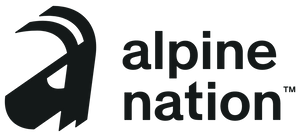Seeing as us Alpine Princesses love spending time in nature, it is only right that we take good care of it. Our new Eco line does just that.
For the production of our Eco line leggings, we use recycled nylon - ECONYL®. It is an innovative nylon yarn, produced entirely from nylon waste such as fishing nets and is infinitely recyclable. The yarns are developed and produced in our very own hometown of Ljubljana, Slovenia by the company Aquafil. We are happy that the production of our leggings thus also contributes to a more sustainable local economy.
The ECONYL® yarns used in our products offer the same quality and performance as regular Nylon, with the added environmental benefits due to the fact that they come from regenerated waste and are 100% endlessly recyclable.
Through an advanced recycling process, the waste materials are broken down and then produced again with the exact same performance as traditional nylon (from fossil materials). This process can be repeated infinitely and thus forms the basis for a closed-loop cycle of regenerated - and regenerable – nylon products. Regeneration means that the material is recycled with perfect quality – retaining nylon’s inherent strength, durability and lightness – and that the new products can potentially be recycled indefinitely.
The positive impacts this has on the environment:
- saving crude oil,
- avoiding unnecessary CO2 emissions,
- reclaiming waste materials and putting them to good use.
So, how do we go from recycled waste to producing the outdoor leggings that accompany you on your adventures?
1.The making of ECONYL® yarn starts with the rescue of nylon waste.
A variety of recovered materials, such as abandoned ghost fishing nets, fabric scraps from mills, carpet flooring and industrial plastic are collected from oceans around the world and tested at the laboratory in Ljubljana, Slovenia. This is an important step because it helps to protect our ocean environments by removing so called “ghost nets,” which have been lost and left at the sea and pose a serious threat to marine life. The waste is collected through different initriatives, where volunteer divers recover fishing nets from the bottom of the European seas.
2. The collected nylon waste is recycled back and developed into a ECONYL® regenerated nylon.
Using a radical regeneration process and with as little water and energy possible, the nylon waste is recycled back to its original purity. By melting the different kinds of waste materials and “un-zipping” the nylon, this generated nylon has the same high quality as virgin nylon, without the traditional process of deriving it from oil. By eliminating the need for crude oil, CO2 emissions are also drastically reduced.
Any excess energy from the Aquafil plant goes into heating the pools of it's neighbour, Atlantis, the city's largest water park.
This initiative results in a significant decrease of the thermal energy which Atlantis purchases from the power plant of Ljubljana, and will reduce the overall production of thermal energy within the city by the same amount. More than 2.000.000 kilograms of CO2 emissions are expected to be avoided each year, that corresponds to 1100 cars driving each 35 km a day
3. ECONYL® regenerated nylon is then sent to Italy, where it is transformed into a high quality, eco-friendly fabric.
is certified as STANDARD 100 by OEKO-TEX®. This is one of the world’s best-known labels for textiles tested for harmful substances. Some people speculated that recycled plastic fabrics may not be safe against the skin due to BPA and other substances found in plastics. We can assure you that the fabric we use (and most recycled fabrics on the market) are free of these.
4.The material is transported to Croatia for cutting and sewing.
The sustainable fabric is then sent to our partner manufacturers in the neighbouring Croatia, where it then ends up in the hands of a few very talented ladies with huge attention to detail. These ladies cut the material for each pair of leggings and before they are sewn together the logo and label printing is done through a heat transfer process.
5. Efficient sewing
The material is now ready for sewing. Our leggings are made of 9 smaller panels, which means there is less fabric wastage per leggings (as opposed to a few large panels). The sewers check each product before it is completed and sent to our office in Ljubljana, Slovenia.
6. Sustainable packaging
Finally we have our leggings! All the product tags are attached with safety pins and string (no plastic). Once the leggings are ready, they are transported to our warehouse, to the final part of the Alpine Princess team, which carefully packs your orders into our cardboard boxes before they are sent across the world to your door!
